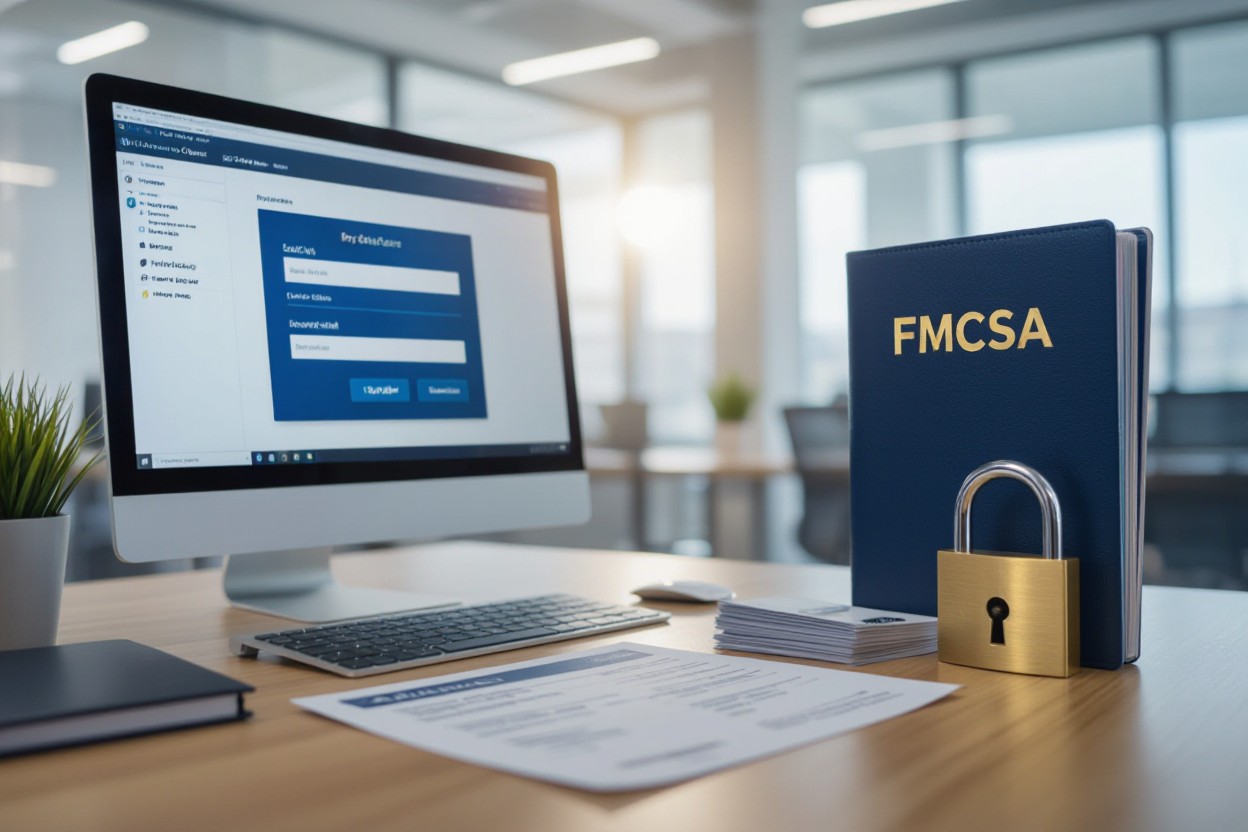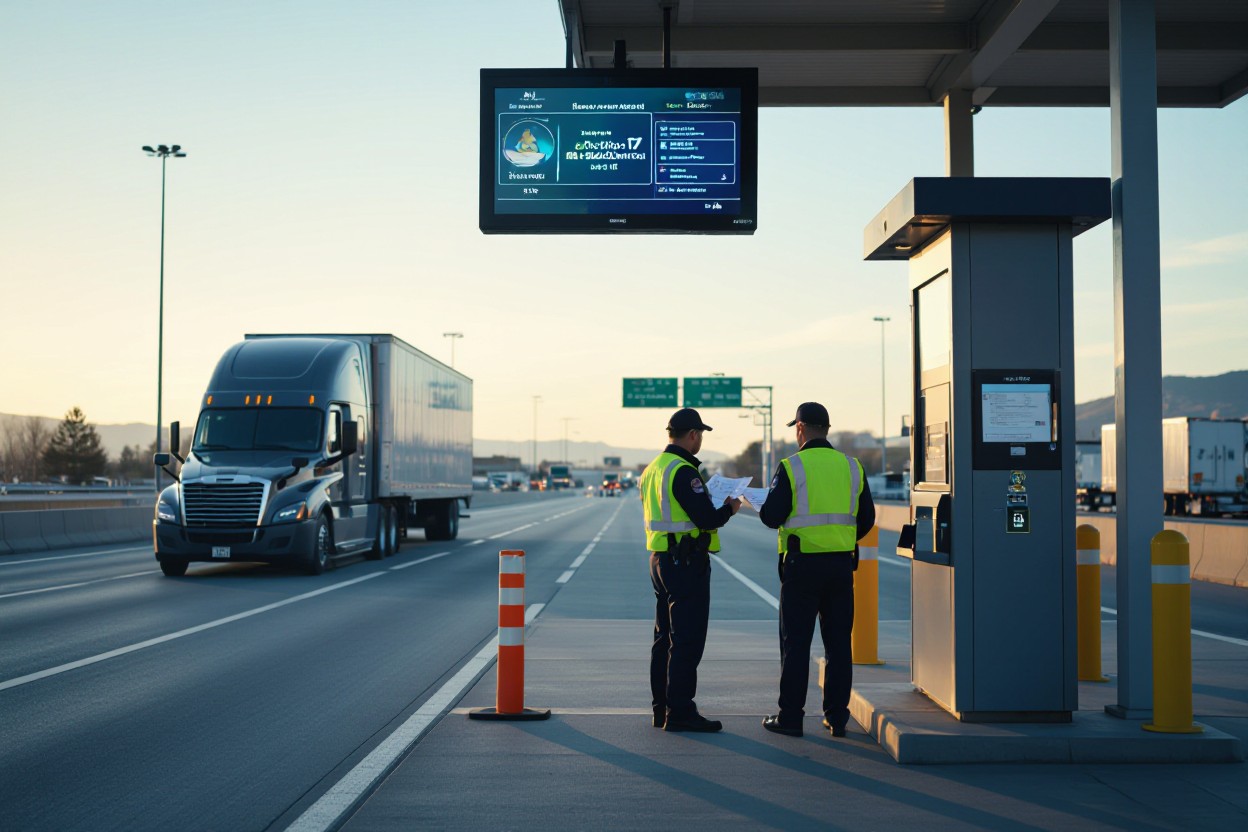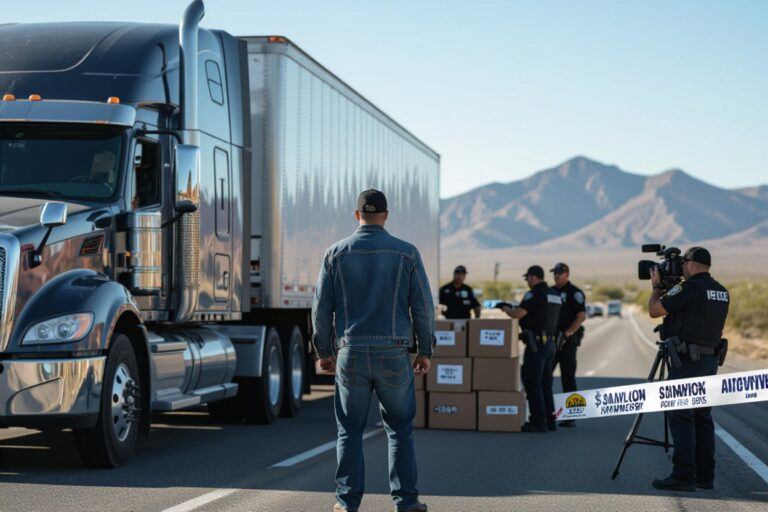It’s important that you understand how the FMCSA’s updated motor carrier registration system works to protect your business from rampant fraud and identity theft in the freight industry. This new system introduces mandatory identity verification for all carriers, ensuring that only legitimate operators receive USDOT numbers. By requiring you to complete a secure, mostly online process backed by advanced biometric technology, the FMCSA aims to close loopholes exploited by fraudsters, ultimately safeguarding your company’s safety and financial well-being in an increasingly targeted industry.
Key Takeaways:
- The FMCSA has introduced identity verification in the Unified Registration System (URS) to combat widespread fraud affecting motor carriers, brokers, and others in the freight industry.
- Most applicants can complete the verification process online through the new system, Modus, which is supported by biometric technology from IDEMIA and supplemented by verification centers for those needing in-person assistance.
- The updated registration system aims to remove fraudulent registrants, protect carriers financially, and improve industry safety by ensuring only legitimate entities are registered.
Unmasking the Current Landscape of Fraud in Freight
Fraud in the freight industry pervades every facet of the business, targeting insurance processes, brokers, carriers, and even process agents. As Ken Riddle from the FMCSA highlights, fraudsters constantly adapt, exploiting gaps in verification systems to infiltrate the Unified Registration System (URS). Attacks range from identity theft to sophisticated cargo heists, fueling a pervasive threat that undermines trust and operational integrity. Knowing the areas vulnerable to fraud allows you to better anticipate and defend against evolving tactics that aim to exploit your business and derail safety compliance.
The Financial Toll on Motor Carriers
Fraud erodes your company’s resources directly, often leaving less capital for crucial maintenance like tire replacement or brake repairs. When fraud takes money out of your pocket, operational safety can suffer, increasing risk on the road. Beyond immediate losses, fraudulent activities inflate insurance premiums and cause compliance headaches. Knowing these financial strains helps you understand why robust identity verification through FMCSA’s updated URS is vital to protecting your bottom line and maintaining safe operations.
Types of Fraud Affecting the Industry
Common fraud types range from stolen identities used to obtain USDOT numbers illicitly to cargo theft and fraudulent broker activities. Impersonation schemes allow unauthorized parties to operate under your credentials, while bots attempt to flood registration systems seeking to bypass controls. Chartering fake carriers and manipulating insurance lanes contribute to complex fraud webs. Knowing these schemes helps you recognize why implementing stringent verification measures is necessary to secure your company’s operations.
| Fraud Type | Description |
|---|---|
| Identity Theft | Fraudsters misuse legitimate carrier identities to register fake USDOT numbers. |
| Cargo Heists | Unauthorized seizure and theft of freight goods during transit. |
| Insurance Scams | False insurance claims or fake policy registrations. |
| Broker Fraud | Unlicensed or fake brokers manipulating shipment contracts. |
| Bot Attacks | Automated attempts to overwhelm registration systems and bypass controls. |
Understanding these varied fraud methods sheds light on why the FMCSA has introduced identity verification through the URS. Fraud often operates in overlapping layers—bots may attempt entry, while stolen identities facilitate illegitimate registrations. You should remain vigilant about these threats since any successful fraud not only damages your finances but also compromises safety and regulatory compliance. Knowing how these fraud types function equips you to support and rely on enhanced, technology-driven verification systems, such as the one provided by FMCSA and IDEMIA.
- Identity theft enables unauthorized operators to register under false pretenses.
- Cargo heists directly steal freight, causing losses and delays.
- Insurance scams increase costs and complicate claims processing.
- Broker fraud can disrupt contractual trust and shipment reliability.
- Bot attacks test system vulnerabilities to gain illicit access.
Revolutionizing Registration: The New URS Explained
The updated Unified Registration System transforms your motor carrier registration experience by adding a robust layer of identity verification designed to stop fraudsters at the door. Through a streamlined process backed by advanced biometric technology, the system ensures that only legitimate carriers and brokers gain access, protecting your business and the industry’s integrity. With the rollout starting for new applicants and plans to include all current registrants, you can expect a safer, more secure way to obtain and maintain your USDOT number.
The Role of the Unified Registration System (URS)
The URS serves as the centralized portal where you apply for your USDOT number, a key identifier for tracking safety records, compliance, and incidents. It covers motor carriers operating vehicles over 10,000 pounds, moving hazardous materials, as well as brokers and freight forwarders. This system acts as your company’s official gateway into the FMCSA’s regulatory framework, linking your credentials with your operations seamlessly.
Required Elements of the Updated System
Identity verification now stands at the core of URS enhancements, requiring you to confirm who you are through a reliable, secure process either online or at a verification center. Built to thwart persistent fraud attempts, the updated URS integrates biometric and cryptographic technology powered by IDEMIA, a trusted TSA contractor, ensuring your registration is both legitimate and protected.
The system demands a thorough identity check completed in just five steps, enabling nearly 98% of applicants to finish online from their own homes. Those rare cases needing in-person verification will be supported by a growing network of up to 300 enrollment centers nationwide, minimizing travel burdens. This layered approach blocks bot attacks and fraudulent registrations, tightening security while keeping the experience user-friendly for providers like you.

Identity Verification: A Game Changer in Protecting Carriers
The introduction of identity verification within the FMCSA’s new registration system marks a significant leap forward in tackling pervasive fraud. By requiring applicants to prove their identity through biometric and cryptographic methods, the system stops many fraudulent actors before they can even register. This additional layer protects you by ensuring that only legitimate carriers gain access, reducing the financial strain fraud places on honest operators. More than just paperwork, this innovation strengthens overall industry integrity and helps secure safety resources for carriers who depend on them.
Implementation Timeline and User Experience
Since mid-April, new applicants must complete the five-step identity verification process, mostly done online from the comfort of your home or office. While 98% of users smoothly navigate this digital system, a small percentage may need to visit one of the currently 87 verification centers, with plans to expand to 300 nationwide. This rollout strategy lets you start protecting your business immediately without waiting for full infrastructure build-out, easing the transition for existing registrants who will face mandatory verification upgrades later.
How Verification Deterrents Combat Fraud
The system’s biometric and cryptographic safeguards create a robust barrier against fraudsters and automated bots, which have persistently tried to breach the URS. These deterrents effectively block unauthorized access, ensuring that those who can’t verify their identity face a firm stop. This strategic filtering keeps your competition fair and prevents impostors from siphoning funds that could otherwise maintain vehicle safety and company health.
By integrating verification technologies typically reserved for high-security environments like TSA checkpoints, FMCSA leverages proven tools to protect motor carriers. These deterrents identify anomalies, inhibit repeated fraudulent attempts, and confirm applicants against multiple databases in real time, making fraudulent registrations exponentially harder. This not only safeguards your company’s financial interests but also strengthens the overall trustworthiness of the motor carrier community.
The Technical Backbone: Insights into the Modus System
The Modus system serves as the new digital gatekeeper for motor carrier registration, integrating sophisticated identity verification methods to block fraudulent activity. Designed to be a comprehensive platform, it streamlines your registration while offering multiple avenues for verification—whether through online processes or physical enrollment centers. Handling nearly 98% success online, Modus leverages advanced technologies to make identity confirmation both accessible and secure, tightening the industry’s defenses against increasingly complex fraud attempts.
Collaboration with Biometric Technology Provider IDEMIA
IDEMIA powers the biometric and cryptographic pillars of Modus, using the same proven technology trusted by TSA checkpoints nationwide. Their system links your biometric data across important federal databases, ensuring that red flags surface instantly. This partnership means you benefit from cutting-edge fraud detection tools that authenticate identities with precision and speed, reducing your risk of identity theft while simplifying enrollment.
Multifaceted Approach to Data Sharing and Security
Modus employs an integrated data-sharing framework that connects diverse government and industry databases, enabling real-time validation of your credentials. This mesh of information flows includes biometric data, registration history, and compliance records, giving the FMCSA a fortified grip on authenticity. These layered defenses actively filter out fraudulent applications and maintain the integrity of your registration process.
The data-sharing architecture behind Modus uses encrypted channels and strict access controls that restrict information flow strictly to verified entities. It combines biometric verification with cross-agency data comparisons, so your personal and business information gains multiple layers of scrutiny. This collaborative ecosystem not only detects suspicious activity quickly but also supports ongoing monitoring, helping to guard you against evolving scam techniques within the freight industry.

The Path Ahead: Anticipating Future Challenges and Solutions
The FMCSA’s updated registration system marks a significant step, but your vigilance remains crucial as fraudsters continuously evolve their methods. The rollout of identity verification is just the beginning; anticipating new scams and adapting equally swift countermeasures will determine how effectively you and the industry safeguard assets and safety. Expect ongoing refinements to the system, expanded enrollment centers, and enhanced collaboration across agencies to maintain a strong defense against increasingly sophisticated fraud tactics targeting every link in the freight chain.
Identifying the 2%: Distinguishing Fraudulent Actors
That persistent 2% of applicants unable to complete online verification often represents a mixed group. Some are clearly fraudulent entities trying to bypass safeguards, while others are legitimate motor carriers or individuals facing technical or documentation hurdles. You need to understand this distinction because helping genuine applicants navigate the process preserves industry participation while rigorously excluding bad actors drains the fraud pipeline before it can impact your business.
Ongoing Adaptation to Fraud Tactics
Fraudsters move quickly, crafting new schemes that test URS defenses shortly after each upgrade. You’ve already seen how bots relentlessly attack the system’s front door, yet advanced biometric checks and database integration block their entry. Staying ahead means continually updating identity verification methods, leveraging AI to detect unusual patterns, and expanding data-sharing partnerships. Your role includes cooperating with these evolving technologies to ensure that new fraud attempts never gain foothold in your operations.
The landscape of motor carrier fraud changes rapidly, demanding constant vigilance. For example, as synthetic identity fraud grows more complex, the FMCSA’s collaboration with IDEMIA enables real-time biometric and cryptographic verification that adapts dynamically to emerging threats. You can anticipate future updates incorporating predictive analytics to spot anomalies before registration approval, and rollout of mobile enrollment options that combine convenience with security. Harnessing these tools empowers you to stay one step ahead as fraudsters attempt new approaches, making your compliance efforts more resilient and the entire industry safer.
Final Words
Now, with the FMCSA’s updated motor carrier registration system, you are better protected against fraud and identity theft. By requiring identity verification through a secure and efficient process, the system helps ensure only legitimate carriers gain access, safeguarding your business and the industry as a whole. As the new system rolls out fully, you will experience a more secure environment that supports the integrity and safety of motor carrier operations nationwide.
FAQ
Q: What is the main purpose of the FMCSA’s new motor carrier registration system?
A: The primary goal of the updated registration system, known as the Unified Registration System (URS), is to reduce fraud and identity theft within the motor carrier industry. By introducing identity verification as part of the registration process, the FMCSA aims to ensure that only legitimate carriers and applicants are registered, thereby protecting companies from fraudulent activity that can impact safety and financial stability.
Q: How does the identity verification process work in the new URS system?
A: Identity verification involves a series of steps that applicants complete, mostly online, to confirm their identity before registration is approved. The FMCSA partnered with IDEMIA, a company specializing in biometric and cryptographic solutions, to enable a secure system that cross-checks applicant data with multiple databases. While most users can complete verification remotely, some may need to visit one of the designated enrollment centers, which are planned to increase from the current 87 to 300 nationwide.
Q: What happens to existing motor carriers already registered in the URS under the new system?
A: Once the FMCSA finalizes the new registration system, all existing registrants will be required to complete the identity verification process, not just new applicants. This measure is intended to remove any fraudulent entries from the system and ensure that all registrants meet the updated security standards, helping to protect honest carriers from the financial and safety risks posed by fraud.


